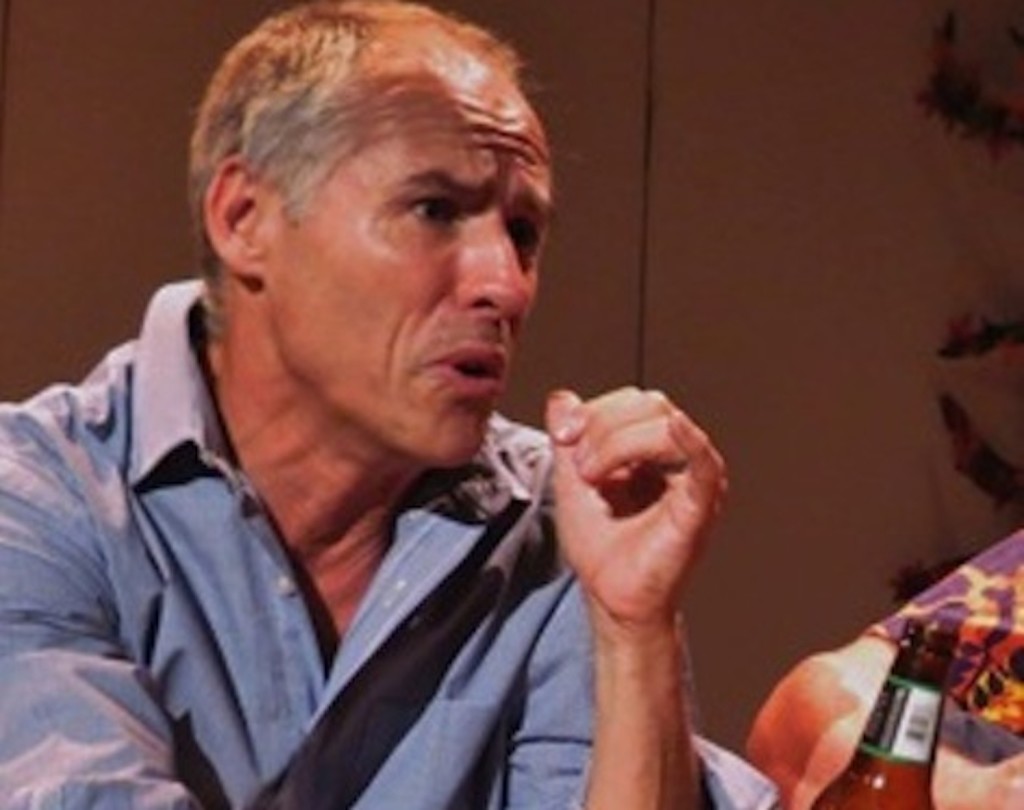Ingenious use is made of back projection, wobbly, vague like an old home movie, of the three former school friends walking through bush into their camp site. Chas (a driven Gerry Sont), a real estate agent, bounds ahead despite carrying all the baggage, neatly dressed in shirt and slacks but wearing a ‘bush’ hat. Harvey (Martin Ashley Jones, a latter day ‘sexy beast’), a barrister, follows in Hawaiian style shirt, bottle opener pendant, and baggy calf-lengths, long hair and dark glasses, and darting about trying to find a less difficult passage than the boulders chosen by Chas, is Wilbur (the panicky Steve McGrath) a psychiatrist, small, timid in appearance but wearing army style cap and tee-shirt. Three characters from post-modern Canterbury Tales all with a story, whom we feel we know before we meet them on stage in a brilliantly conceived transition.
The place at which they emerge is a mystery and its location in the human comedy signalled by well-timed kookaburra calls. Described both as a ‘remote paradise’ and ‘prime real estate, site of a future time share’, it is reached only by walking from a hired four-wheel drive which eventually vanishes. Their mobiles do and don’t work. A stretch of water is described alternately as water/black hole. The vividly painted (dead) branches strewn about the stage and plain backdrop allowing changes of colour to match mood further suggest a psychological landscape. And there are hundreds of brightly coloured autumn leaves in evergreen bush and, as noted by Harvey, at the wrong time of the year.
This shedding, an apparent loss, perhaps instead offers opportunity for growth. The three men are not at ease in a natural environment. Chas has brought tennis racquets, Harvey feels he is missing out on sexual action and Wilbur needs distance from both earth and his friends hence his camping chair. The difficulty the men have in connecting is admirably actualised through the need for them to negotiate an obstacle crowded stage floor. Their talk, while often wonderfully witty at each other’s expense or just plain funny, reveals relationship problems with women, in particular, the relevantly named Angela, Constance and Grace.
They seem at fifty to be ‘dead white males’ at a ‘dead end’. We notice that it is Chas who has orchestrated the trip and for whom it is most important. Chas has something to tell and after a few beers, Wilbur’s pharmaceuticals, his Mister Neat outfit muddied, he lets go of the male compulsion to appear in control. He goes even further … do go see for yourself.
Leaves deserves high praise for its spot-on casting, brilliant set and costumes that were much more than just clothing, (EMU Arts), and imaginative use of back projection as well as appropriate and well-timed sound and lighting (Kyle Stephens). While much of the director’s work (Markus Weber), supported by stage management (Kira Matlachowski), is over once the play begins this well-unified production is testimony to intense preparation.
A special mention should be made of the promotional card (Nadja Raskovaloff, Anna Jahjah) as the most attractive for a long time.





